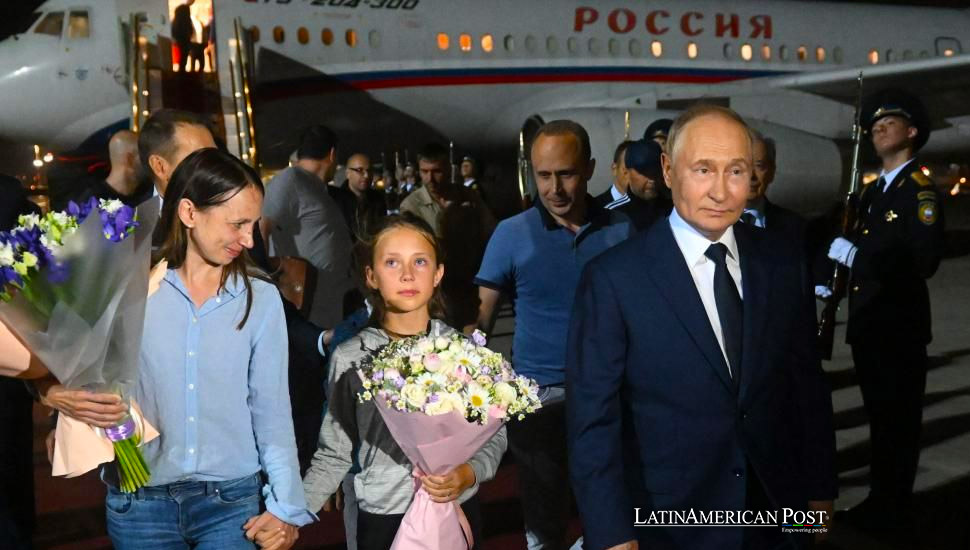Spy Children’s Argentine Upbringing and the Surprise Return to Russia

The children of Russian spies, raised in Argentina and Slovenia, discovered their true nationality mid-flight to Moscow after a significant prisoner swap.
The children of a Russian spy couple returned home last week after the most prominent prisoner swap between the West and Russia since the Cold War. Raised in Argentina and Slovenia, the children only discovered their Russian nationality during the flight to Moscow. Artem Viktorovich Dultsev and Anna Valerevna Dultseva had posed as an Argentine couple in Slovenia before being jailed. Their children, unfamiliar with Russian culture and politics, asked their parents. They greeted them upon arrival in Moscow, revealing their lack of knowledge about President Vladimir Putin, as Kremlin spokesman Dmitry Peskov stated.
Artem and Anna, known in Argentina as María Mayer and Ludwig Gisch had spent years blending into their assumed lives. Their story began in Argentina, where they presented as a typical Argentine couple. Their children, Sofia and Gabriel, were born in Argentina, grew up speaking Spanish, and were deeply rooted in Argentine culture. The couple moved to Slovenia in 2017, where Artem established a start-up IT company, and Anna ran an online art gallery, all under their Argentine aliases.
The family’s life in Slovenia seemed ordinary until 2022 when Slovenian police arrested Artem and Anna on espionage charges. The arrest revealed their true identities as Russian spies, shattering the facade they had maintained for years. Unaware of their parents’ true profession, their children continued living their daily lives, oblivious to the events that would drastically change their future.
Life in Slovenia and the Arrest
In Slovenia, the couple continued their clandestine activities while maintaining the guise of an average family. Their integration into Slovenian society appeared seamless, and they used Ljubljana as their base of operations. It wasn’t until their arrest in 2022 that the full extent of their espionage activities came to light. The couple pleaded guilty to spying charges and were sentenced to 19 months in prison each. Due to their time served, they were released and ordered to leave Slovenia.
The arrest and subsequent sentencing highlighted undercover espionage work’s intense and often complex nature. Unlike diplomats and other officials with legal cover and diplomatic immunity, “illegals” like Artem and Anna operated entirely under the radar, making significant personal sacrifices. This dedication to their service meant that even their children were kept in the dark about their true identities and the nature of their work.
Return to Russia and a New Reality
The large-scale prisoner swap between Russia and the West facilitated the return of Artem, Anna, and their children to Russia. The swap involved 24 individuals jailed in seven countries and included notable figures such as Wall Street Journal reporter Evan Gershkovich. The Dultsev family’s return marked a significant moment in this exchange, highlighting such international negotiations’ personal and political complexities.
Sofia and Gabriel’s lives changed drastically when they were uprooted from their familiar surroundings and flown to Moscow. It was only mid-flight that they learned of their true Russian nationality. The children’s confusion upon arrival, highlighted by their unfamiliarity with President Putin, underscored the deep cultural disconnect they felt. They were raised in Argentina and Slovenia and had no prior exposure to Russian culture or politics.
Their arrival in Moscow was marked by a warm welcome, with President Putin greeting the family. The president’s greeting in Spanish, “Buenas noches,” aimed at comforting the children, further emphasized the unusual circumstances of their upbringing. The Kremlin’s efforts to reintegrate the family into Russian society will undoubtedly be a challenging transition for Sofia and Gabriel, who must now adapt to an entirely new environment and identity.
The Broader Implications
The Dultsev family’s story sheds light on the broader implications of espionage and international relations. Using “illegals” in intelligence work demonstrates the lengths countries will go to gather information and influence global events. The personal sacrifices made by these operatives, including living double lives and keeping their true identities hidden even from their families, highlight the high stakes involved in espionage.
The children’s experience also underscores the human impact of political and intelligence operations. Raised in Argentina and Slovenia, Sofia and Gabriel now face the daunting task of adjusting to life in Russia, a country they had no previous connection to. Their story is a poignant reminder of the innocent lives affected by the complex web of international espionage and political maneuvering.
Also read: Argentina’s Napalpí Massacre and the Struggle for Indigenous Reparations
The return of the Dultsev family to Russia following a major prisoner swap highlights the personal and political intricacies of espionage. For the children raised as Argentines and suddenly thrust into a new reality, the transition will be a challenging and transformative experience. Their story offers a unique perspective on the human side of international relations and the far-reaching impact of espionage activities.





